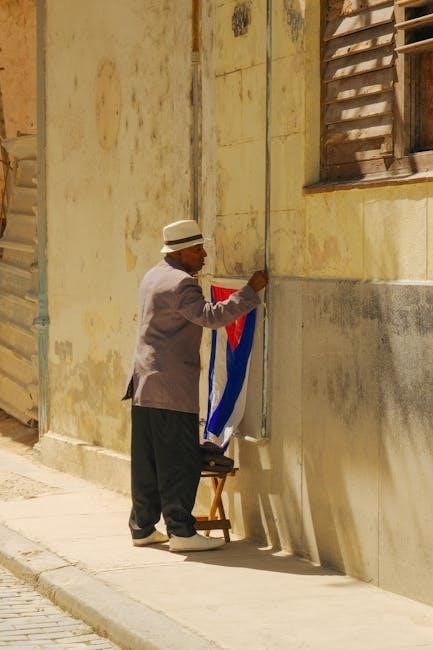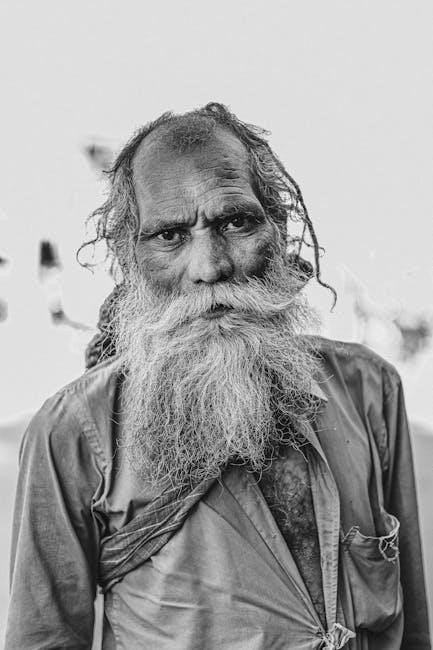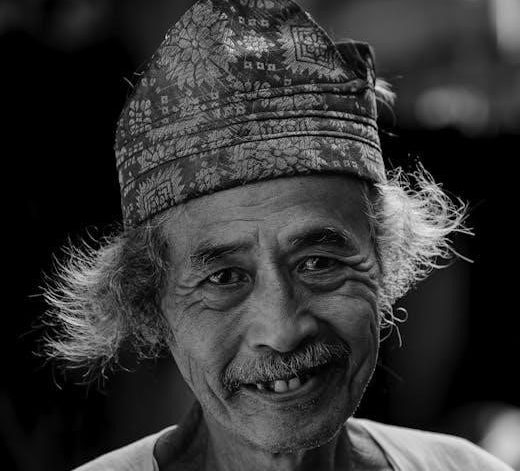Early Life and Background
Olaudah Equiano was born in 1745 in the kingdom of Benin, Nigeria, to the Igbo people. His early life was shaped by African traditions and community values.
1.1 Birthplace and Ancestry
Olaudah Equiano was born in 1745 in the kingdom of Benin, in what is now southeastern Nigeria. He belonged to the Igbo people, a prominent ethnic group in the region. His father was a local chief, and the family lived in the village of Eboe. Equiano’s early life was deeply rooted in African traditions, with a strong emphasis on community and cultural practices. His ancestry and birthplace shaped his identity, as he later reflected on the rich cultural heritage of his homeland in his autobiography. This connection to his origins remained central to his narrative, even as his life took dramatic turns beyond Africa.
1.2 Cultural and Family Context
Olaudah Equiano grew up in a culturally rich environment, surrounded by the traditions of the Igbo people. His family was deeply rooted in communal values, with his father serving as a local chief. This position granted the family respect and influence within their village. Equiano’s early life was marked by rituals, storytelling, and a strong sense of community, which shaped his identity. His upbringing instilled in him a deep appreciation for African customs and practices, even as his life took him far from his homeland. These cultural influences later became central to his narrative, as he reflected on the contrast between his African heritage and the realities of slavery.
Capture and Enslavement
Olaudah Equiano was captured as a child, separated from his family, and sold into slavery. This traumatic event marked the beginning of his harrowing journey into bondage.
2.1 The Raid on His Village
Olaudah Equiano’s life changed dramatically when his village was raided by slavers. At just 11 years old, he and his sister were captured during a sudden attack while their parents were away. The raid was violent and chaotic, leaving the village devastated. Equiano described the terrifying moment of separation from his family and the overwhelming fear that gripped him. The attackers, armed and ruthless, took the children and other villagers, marking the beginning of Equiano’s traumatic journey into slavery. This event, as recounted in his autobiography, highlights the brutal nature of the transatlantic slave trade and its profound impact on African communities.
2.2 The Middle Passage Experience
Olaudah Equiano endured the horrors of the Middle Passage, a brutal journey across the Atlantic. He was chained in overcrowded and unsanitary conditions, witnessing widespread suffering and death. Disease spread rapidly, and many enslaved Africans perished. Equiano described the psychological toll, including despair and hopelessness, as he faced the harsh realities of slavery. The crew’s cruelty added to the torment, with floggings and mistreatment commonplace. Equiano’s account vividly portrays the inhumane conditions and the profound emotional impact on those forced into this brutal system. His experiences during the Middle Passage deeply shaped his later advocacy against slavery, making him a powerful voice for abolition.

Life as a Slave
Olaudah Equiano faced harsh conditions, forced labor, and mistreatment. Despite the brutality, he demonstrated resilience, adapting to his circumstances while maintaining his determination to survive and resist oppression.
3.1 Early slave experiences in the Caribbean
Olaudah Equiano’s arrival in the Caribbean marked the beginning of his harrowing life as a slave. He was exposed to the brutal realities of plantation slavery, including relentless labor and harsh treatment.
The conditions were dehumanizing, with little regard for the welfare of enslaved people. Despite the physical and emotional toll, Equiano demonstrated resilience, adapting to his surroundings while holding onto his identity and dignity.
His early experiences in the Caribbean shaped his understanding of the slave system’s cruelty and fueled his determination to resist oppression and seek freedom. These events laid the foundation for his later advocacy against slavery;
3.2 Ownership by Captain Michael Henry Pascal
Olaudah Equiano’s life took a significant turn when he was purchased by Captain Michael Henry Pascal, a British naval officer. Renamed “Gustavus Vassa,” Equiano was subjected to harsh treatment, reflecting the brutal nature of slavery.
Despite the cruelty, Equiano learned valuable skills, including navigation and the English language, which later aided his quest for freedom. His resentment toward Pascal grew, but these experiences shaped his resolve to challenge the system of oppression;
Equiano’s time under Pascal was marked by both hardship and resilience, ultimately contributing to his determination to fight for his liberation and advocate for the abolition of slavery.

Path to Freedom
Olaudah Equiano’s journey to freedom began with determination and resilience. He learned to read, write, and navigate, skills that ultimately enabled him to earn and secure his liberation.
4.1 Learning to Read and Write

Olaudah Equiano’s ability to read and write was pivotal in his quest for freedom; Despite the challenges of slavery, he learned the alphabet from a kind slave and later received informal education. He practiced tirelessly, often secretly, to master reading and writing. These skills not only broadened his understanding of the world but also empowered him to navigate the legal and social systems. His literacy allowed him to document his experiences, communicate with abolitionists, and eventually advocate for his freedom. This newfound knowledge became a cornerstone of his identity and a tool for liberation, setting him apart from others in bondage.
4.2 The Legal Battle for Freedom
Olaudah Equiano’s legal battle for freedom was a testament to his resilience and determination. After gaining literacy, he used his knowledge to navigate legal systems and advocate for his rights. His autobiography served as a powerful tool, detailing his experiences and challenging the morality of slavery. By documenting his life, he provided evidence of his humanity and intellect, undermining the dehumanizing narratives used to justify slavery. His legal efforts, combined with his activism, helped pave the way for abolitionist movements. Equiano’s fight for freedom not only liberated him but also inspired others to challenge the institution of slavery, leaving a lasting legacy in the struggle for equality and justice.
Abolitionist Activism
Olaudah Equiano emerged as a prominent abolitionist, leveraging his autobiography to expose the horrors of slavery and advocate for its eradication, significantly influencing public opinion and the abolitionist movement.
5.1 Role in the Abolitionist Movement
Olaudah Equiano played a pivotal role in the abolitionist movement by sharing his harrowing experiences through public speaking and writing. His autobiography served as a powerful tool to expose the brutality of slavery, garnering widespread empathy and support. Equiano’s vivid descriptions of the Middle Passage and enslaved life humanized the suffering of Africans, challenging the moral acceptance of slavery. He collaborated with prominent abolitionists and organizations, advocating for legislative change. His influence extended to British society, helping to shift public opinion and pressing policymakers to consider the ethical implications of the slave trade. Equiano’s activism was instrumental in the eventual abolition of slavery in the British Empire.
5.2 Publication of His Autobiography
Olaudah Equiano’s autobiography, The Interesting Narrative of the Life of Olaudah Equiano, or Gustavus Vassa, the African, was first published in 1789. This groundbreaking memoir detailed his experiences as a slave and his journey to freedom, becoming a cornerstone of abolitionist literature. The book vividly described the horrors of the Middle Passage and the brutality of slavery, resonating deeply with readers. Equiano traveled extensively to promote the work, which gained widespread popularity in Britain and beyond. Its influence helped shift public opinion against slavery, contributing to the eventual abolition of the transatlantic slave trade. The autobiography remains a seminal work in the history of abolitionism and African diasporic literature.

Legacy and Cultural Impact
Olaudah Equiano’s autobiography became a cornerstone of African diasporic literature, influencing anti-slavery movements and inspiring future generations with its vivid account of resilience and advocacy.
6.1 Historical Significance
Olaudah Equiano’s autobiography is a landmark work in the history of slavery and abolition. Published in 1789, it provided a personal and detailed account of the transatlantic slave trade, exposing its brutality and inhumanity. His narrative humanized enslaved Africans, challenging stereotypes and influencing public opinion in Europe and America. Equiano’s work became a powerful tool in the abolitionist movement, inspiring political and social change. It remains a critical historical document, offering insights into the experiences of enslaved people and the global impact of slavery. Equiano’s legacy endures as a foundational text in the fight for racial justice and human rights.
6.2 Modern Cultural Influence
Olaudah Equiano’s autobiography continues to resonate in modern culture, shaping discussions on race, identity, and social justice. His narrative has inspired films, plays, and books, ensuring his story remains relevant. Equiano’s life is often referenced in educational curriculums, highlighting the ongoing impact of his experiences. His legacy influences contemporary movements against racism and inequality, offering historical context to modern struggles. The autobiography remains a vital resource for understanding the transatlantic slave trade’s lasting effects. Equiano’s voice bridges the past and present, fostering empathy and awareness. His influence extends beyond literature, impacting art, education, and activism, cementing his role as a cultural icon and a symbol of resilience and freedom.




